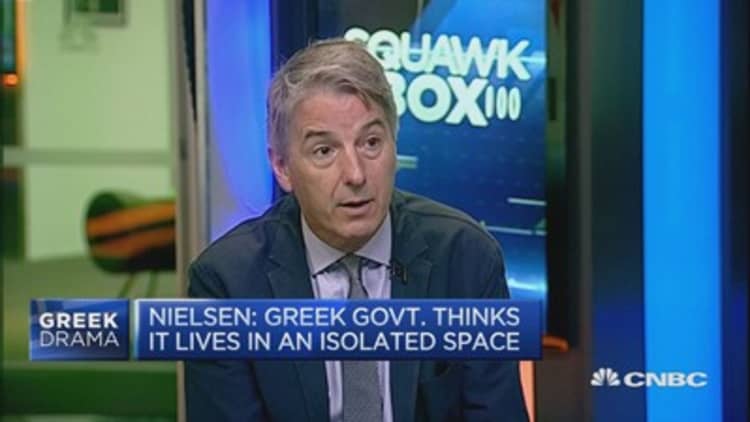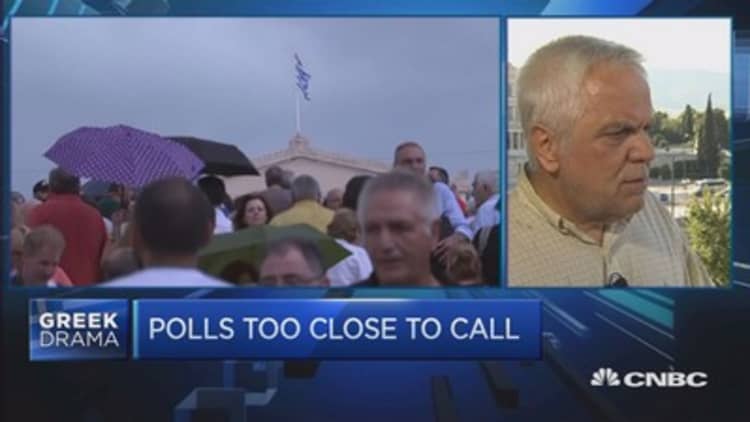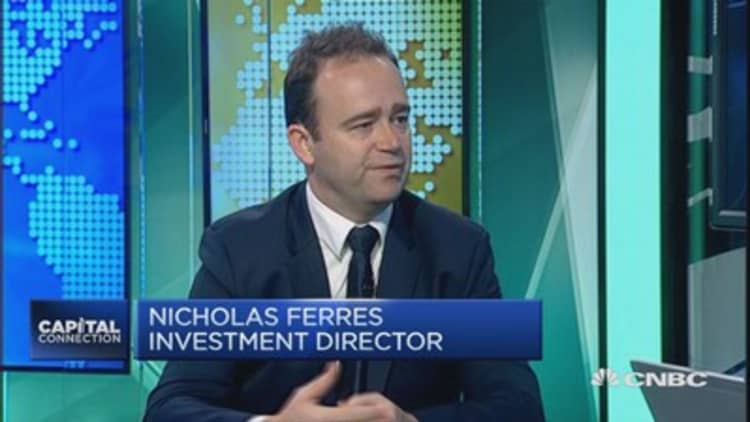




Negotiations between Greece and its international lenders might be off until the referendum on the country's future on Sunday, but the blame game continues behind the scenes.
A day of conflicting reports and dashed expectations on Wednesday left economists and analysts bemused over whether Greek Prime Minister Alexis Tsipras was any closer to a deal with lenders.
"Yesterday was another day with tactical moves from all sides in the Greek crisis and a Socrates-like conclusion: all we know is that we know nothing," senior economist at ING, Carsten Brezski said in a note Thursday.
"Day one after Greece's default on the IMF, which officially is not called default, and the end of its bailout program offered again plenty of turbulences. A new letter from Tsipras, speculation about a cancellation of the referendum, Angela Merkel in the German parliament, Tsipras on television, a Eurogroup conference call...This is the summary yet another 'normal' crazy day in the Greek crisis."
It comes after two seemingly conciliatory letters sent from Tsipras to lenders raised hopes that Greece was ready to capitulate to lenders demands on reforms and spending cuts.
By the evening, however, Tsipras was once again espousing public defiance, telling the Greek public in a televised address not to give in to lenders "blackmail" and urging Greeks to vote "no" in a referendum on reforms and the bailout program.
In the euro zone too, finance ministers discussed Greece's proposals in a conference call, but afterwards affirmed their decision not to extend Greece's now-expired bailout program. Indeed, Eurogroup head Jeroen Dijsselbloem said the ministers "see no further ground for further talks at this point, nor between Greece and the Eurogroup or between Greece and the (creditor) institutions" until after Sunday's vote.
'We know nothing'
After five months of talks between Greece and its lenders, there were hopes that a last-minute deal could be reached ahead of the referendum, when Greeks effectively have to choose between more austerity, or a "no" vote, which could see Greece crash out of the single currency.
The country has already effectively defaulted this week on a major payment to one of its lenders, the IMF, and its domestic financial system is under severe pressure, with capital controls imposed in order to prevent bank runs.
Poll: How should the Greeks vote?
The European Central Bank (ECB) has been keeping Greek banks afloat with emergency liquidity assistance (ELA) but capped the funding at the weekend. Yesterday, it decided to maintain, rather than increase, the aid, raising questions about how long Greek banks can stay solvent.
Tsipras psychology
The game of cat and mouse between Greece and its lenders has prompted many to question Tsipras' strategy, which appears to veer between placatory and demanding.
ING's Brezski said that, in trying to understand Tsipra' actions, "the only explanation is that his letter to the Eurogroup was just another tactical move to stay ahead of the euro zone in the ongoing blame game, rather than a serious change of mind."
"The answer by Merkel and the Eurogroup was a strong signal that the euro zone will not move anymore ahead of the referendum. Even if an agreement would be possible, too much trust has been destroyed that it is hard to see that the euro zone would believe Tsipras this time around," he added.
Read More'The mood is black': Greeks struggle amid crisis
The latest referendum poll, by financial news service Euro2day.gr, put the "yes" vote at 47.1 percent and the "no" vote at 43.2 percent with the remainder undecided. The "no" vote cannot be discounted, however, with anti-austerity demonstrations continuing in central Athens.
Greek Finance Minister, Yanis Varoufakis, said in an interview with Bloomberg on Thursday that he would resign if the "yes" vote won. Prime Minister Tsipras has also indicated he would step down.
Erik Nielson, chief economist at UniCredit, told CNBC Thursday that a "no" vote would mean "game over for Greece" and the current government.
"It means that they would go back to something different from the euro but I doubt that they can reintroduce the drachma in the short-term…so (it means) chaos," he said.
"It's anarchy in the sense that there are pensioners or public employees cannot be paid, so what do they do? Do they go to work? Will normal functions like the police and healthcare system function? The answer is probably no. Almost certainly, the government will fall then, one way or another."
- By CNBC's Holly Ellyatt, follow her on Twitter @HollyEllyatt. Follow us on Twitter: @CNBCWorld


